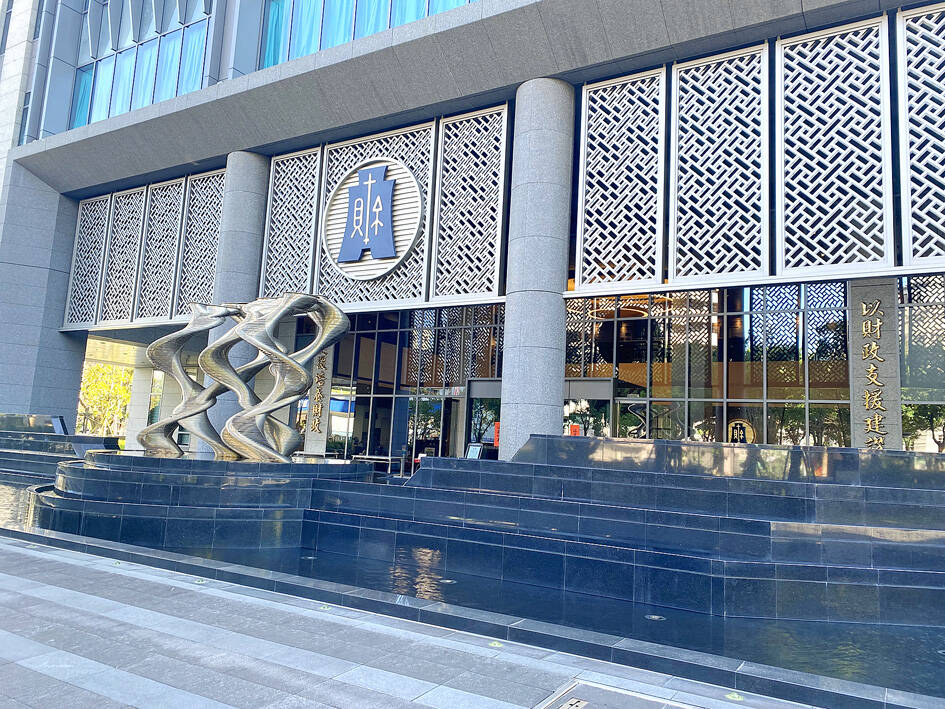The nation’s tax revenue last month rose 24.9 percent year-on-year to NT$165.4 billion (US$5.36 billion) on the back of hefty gains from corporate and personal income taxes, even though income from stock and property transaction taxes declined, the Ministry of Finance said yesterday.
Corporate income tax revenue spiked 38.7 percent annually to NT$14.7 billion, as major Taiwanese companies posted sharp improvements in monthly earnings, the ministry said.
Corporate tax revenue is likely to beat the budget for this year, despite growing economic uncertainty, it said.

Photo: Clare Cheng, Taipei Times
Similarly, personal income tax revenue soared 66.8 percent to NT$91.5 billion, as cash dividends and capital gains taxes from property transactions continued to lend support, the ministry said.
For the first eight months of the year, personal income tax revenue totaled NT$125.7 billion, a solid pickup of 32 percent from the same time last year, the ministry’s data showed.
By contrast, tax revenue from securities trading plunged 42.3 percent year-on-year after daily turnover shrank from NT$497.5 billion to NT$438.2 billion, the ministry said.
Cumulative securities transaction tax revenue in the first eight months amounted to NT$123.5 billion, down 36.7 percent from a year earlier and is unlikely to meet the annual target amid the gloomy sentiment, it said.
Economic uncertainty also affected land value increment tax revenue, which stood at NT$7.3 billion last month, a 12.6 percent drop from a year earlier, the ministry said, adding that the number of taxable cases decreased 4.2 percent year-on-year to 44,006 last month.
Overall tax revenue from January to last month reached NT$2.26 trillion, growing 16.8 percent from a year earlier and meeting 83 percent of the government’s annual target.
“The chance is high that we might see another year of revenue surplus,” the ministry said.

Shares in Taiwan closed at a new high yesterday, the first trading day of the new year, as contract chipmaker Taiwan Semiconductor Manufacturing Co (TSMC, 台積電) continued to break records amid an artificial intelligence (AI) boom, dealers said. The TAIEX closed up 386.21 points, or 1.33 percent, at 29,349.81, with turnover totaling NT$648.844 billion (US$20.65 billion). “Judging from a stronger Taiwan dollar against the US dollar, I think foreign institutional investors returned from the holidays and brought funds into the local market,” Concord Securities Co (康和證券) analyst Kerry Huang (黃志祺) said. “Foreign investors just rebuilt their positions with TSMC as their top target,

REVENUE PERFORMANCE: Cloud and network products, and electronic components saw strong increases, while smart consumer electronics and computing products fell Hon Hai Precision Industry Co (鴻海精密) yesterday posted 26.51 percent quarterly growth in revenue for last quarter to NT$2.6 trillion (US$82.44 billion), the strongest on record for the period and above expectations, but the company forecast a slight revenue dip this quarter due to seasonal factors. On an annual basis, revenue last quarter grew 22.07 percent, the company said. Analysts on average estimated about NT$2.4 trillion increase. Hon Hai, which assembles servers for Nvidia Corp and iPhones for Apple Inc, is expanding its capacity in the US, adding artificial intelligence (AI) server production in Wisconsin and Texas, where it operates established campuses. This

H200 CHIPS: A source said that Nvidia has asked the Taiwanese company to begin production of additional chips and work is expected to start in the second quarter Nvidia Corp is scrambling to meet demand for its H200 artificial intelligence (AI) chips from Chinese technology companies and has approached contract manufacturer Taiwan Semiconductor Manufacturing Co (TSMC, 台積電) to ramp up production, sources said. Chinese technology companies have placed orders for more than 2 million H200 chips for this year, while Nvidia holds just 700,000 units in stock, two of the people said. The exact additional volume Nvidia intends to order from TSMC remains unclear, they said. A third source said that Nvidia has asked TSMC to begin production of the additional chips and work is expected to start in the second

US President Donald Trump on Friday blocked US photonics firm HieFo Corp’s US$3 million acquisition of assets in New Jersey-based aerospace and defense specialist Emcore Corp, citing national security and China-related concerns. In an order released by the White House, Trump said HieFo was “controlled by a citizen of the People’s Republic of China” and that its 2024 acquisition of Emcore’s businesses led the US president to believe that it might “take action that threatens to impair the national security of the United States.” The order did not name the person or detail Trump’s concerns. “The Transaction is hereby prohibited,”